Posted on March 25, 2015 by The Orwell Prize -

Dan Davies has spent more than a decade on a quest to find the real Jimmy Savile, and interviewed him extensively over a period of seven years before his death. In the course of his quest, he spent days and nights at a time quizzing Savile at his homes in Leeds and Scarborough, lunched with him at venues ranging from humble transport cafes to the Athenaeum club in London and, most memorably, joined him for a short cruise aboard the QE2. Dan thought his quest had come to an end in October 2011 when Savile’s golden coffin was lowered into a grave dug at a 45-degree angle in a Scarborough cemetery. He was wrong. In the last two and a half years, Dan has been interviewing scores of people, many of them unobtainable while Jimmy was alive. What he has discovered was that his instincts were right all along and behind the mask lay a hideous truth. Jimmy Savile was not only complex, damaged and controlling, but cynical, calculating and predatory. He revelled in his status as a Pied Piper of youth and used his power to abuse the vulnerable and underage, all the while covering his tracks by moving into the innermost circles of the establishment. Taken from Quercus
Posted on March 25, 2015 by The Orwell Prize -

Roy Jenkins was probably the best Prime Minister Britain never had. But though he never reached 10 Downing Street, he left a more enduring mark on British society than most of those who did. His career spans the full half-century from Attlee to Tony Blair during which he helped transform almost every area of national life and politics. On top of all this, Jenkins was a compulsive writer whose twenty-three books included best-selling biographies of Asquith, Gladstone and Churchill. As Chancellor of Oxford University he was the embodiment of the liberal establishment with a genius for friendship who knew and cultivated everyone who mattered in the overlapping worlds of politics, literature, diplomacy and academia; he also had many close women friends and enjoyed an unconventional private life. His biography is the story of an exceptionally well-filled and well-rounded life. Taken from Random House
Posted on March 25, 2015 by The Orwell Prize -

David Gardner is the FT‘s international affairs editor and author of Last Chance: The Middle East in the Balance. He was the paper’s Middle East editor from 1995-99. In 2003 he won the David Watt prize for political journalism for his writing on the Arab world.
Articles submitted
- Lebanon on the brink – Financial Times Weekend Magazine, 17/05/2014
- Iranian bombast belies its interest in a nuclear deal – Financial Times Weekend Magazine, 14/05/2014
- Religion masks a lust for power in the Middle East – Financial Times Weekend Magazine, 08/07/2014
- Look beyond Saudi Arabia for Sunni leadership – Financial Times Weekend Magazine, 08/08/2014
- Isis shows political sophistication as ferocious as its fighters – Financial Times Weekend Magazine, 29/10/2014
- A federal cure for a shattered Middle East – Financial Times Weekend Magazine, 23/12/2014
Posted on March 25, 2015 by The Orwell Prize -

The late 1950s was an action-packed, often dramatic time in which the contours of modern Britain began to take shape. These were the ‘never had it so good’ years, when the Carry On film series and the TV soap Emergency Ward 10 got going, and films likeRoom at the Top and plays like A Taste of Honey brought the working class to the centre of the national frame; when the urban skyline began irresistibly to go high-rise; when CND galvanised the progressive middle class; when ‘youth’ emerged as a cultural force; when the Notting Hill riots made race and immigration an inescapable reality; and when ‘meritocracy’ became the buzz word of the day. The consequences of this ‘modernity’zeitgeist, David Kynaston argues, still affect us today. Taken from Bloomsbury
Posted on March 25, 2015 by The Orwell Prize -
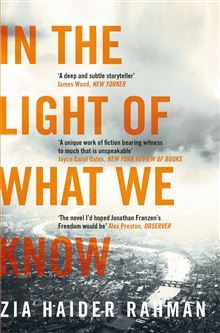
One September morning in 2008, an investment banker approaching forty, his career in collapse and his marriage unravelling, receives a surprise visitor at his West London home. He struggles to place the dishevelled figure carrying a backpack, until he recognizes a friend from his student days, a brilliant man who disappeared years earlier under mysterious circumstances. The friend has resurfaced to make a confession of unsettling power. Theirs is the age-old story of the bond between two men and the betrayal of one by the other. As the friends begin to talk, and as their room becomes a world, a journey begins that is by turns exhilarating, shocking, intimate and strange. Set against the breaking of nations and beneath the clouds of economic crisis, and moving between Kabul, New York, Oxford, London and Islamabad, In the Light of What We Know tells the story of people wrestling with unshakeable legacies of class and culture, and pushes at the great questions of love, origins, science, faith and war. In an extraordinary feat of imagination, Zia Haider Rahman has woven the seismic upheavals of our young century into a novel of rare compassion, scope, and courage. Taken from Pan Macmillan
Posted on March 25, 2015 by The Orwell Prize -

Since 2005, Martin Chulov has been reporting for The Guardian from the Middle East, covering crises across the Arab world.
Articles submitted
Posted on March 25, 2015 by The Orwell Prize -

On June 4, 1989, People’s Liberation Army soldiers opened fire on unarmed civilians in Beijing, killing untold hundreds of people. A quarter-century later, this defining event remains buried in China’s modern history, successfully expunged from collective memory. In The People’s Republic of Amnesia, NPR and former BBC correspondent Louisa Lim charts how the events of June 4th changed China, and how China changed the events of June 4th by rewriting its own history. Lim reveals new details about those fateful days, including how one of the country’s most senior politicians lost a family member to an army bullet, as well as the inside story of the young soldiers sent to clear Tiananmen Square. She also introduces us to individuals whose lives were transformed by the events of Tiananmen Square, such as a founder of the Tiananmen Mothers, whose son was shot by martial law troops; and one of the most important government officials in the country, who post-Tiananmen became one of its most prominent dissidents. And she examines how June 4th shaped China’s national identity, fostering a generation of young nationalists, who know little and care less about 1989. For the first time, Lim uncovers the details of a brutal crackdown in a second Chinese city that until now has been a near-perfect case study in the state’s ability to rewrite history, excising the most painful episodes. By tracking down eyewitnesses, discovering US diplomatic cables, and combing through official Chinese records, Lim offers the first account of a story that has remained untold for a quarter of a century. The People’s Rebulic of Amnesia is an original, powerfully gripping, and ultimately unforgettable book about a national tragedy and an unhealed wound. Taken from Oxford University Press
Posted on March 25, 2015 by The Orwell Prize -

The follies and failures of bankers, regulators and governments have loomed large in public debate over the past five years. In this passionate and hard-hitting book, David Marquand digs deeper. At the heart of our predicament, he argues, lies a profound crisis of our moral economy, our public culture and our democracy. The empire of money has grown remorselessly for three decades, narrowing the space for a common life without which democratic institutions are empty shells. Increasingly, worth is equated with wealth and greed is thought to be good. Inequality has soared as a narrow elite of the super-rich has raced away from the rest of us. Humiliation at the bottom of the pile is matched by callous indifference at the top. The better angels of our nature survive, but they have taken a heavy hit. We are sleepwalking towards a seedy barbarism. The long struggle to master markets and curb property rights in the public interest – a struggle waged by leaders of all the main political families of our history, whether conservative, liberal and socialist or social-democratic – has gone into reverse. The language of the public interest is rarely heard; the notion that the common good should take precedence over individual appetites has virtually disappeared from political discussion. Public trust, essential for properly functioning markets as well as for democratic rule, has plummeted. The fetish of ‘free choice’ has mutated into an unsought communal fate. Marquand’s message is plain: we cannot go on as we are. He sets out the framework of a new public philosophy, based on the values of stewardship, democratic dialogue, civic engagement and freedom from humiliation, to spring the trap into which we have stumbled. Taken from Penguin
Posted on March 25, 2015 by The Orwell Prize -

Rosie Blau is China correspondent for The Economist, based in Beijing. She joined The Economist in May 2011 as a reporter on the Britain section, where she covered energy, transport and a range of other areas. She was then seconded to Intelligent Life as Associate Editor. Prior to joining The Economist she worked at the Financial Times. Her jobs there included Books Editor, Leader Writer and Assistant World News Editor. She served as a judge for the Man Booker Prize for Fiction in 2010. Taken from The Economist
Articles submitted
Empire of the Pig – The Economist, 20/12/2014 The Power of Xi Jinping – The Economist, 20/09/2014 The art is red – The Economist, 20/12/2014 A matter of honours – The Economist, 22/11/2014
Posted on March 25, 2015 by The Orwell Prize -

In a little over a generation the bones and sinews of the British economy – rail, energy, water, postal services, municipal housing – have been sold to remote, unaccountable private owners, often from overseas. In a series of brilliant portraits the award-winning novelist and journalist James Meek shows how Britain’s common wealth became private, and the impact it has had on us all: from the growing shortage of housing to spiralling energy bills.
Meek explores the human stories behind the incremental privatization of the nation over the last three decades. He shows how, as our national assets are sold, ordinary citizens are handed over to private tax-gatherers, and the greatest burden of taxes shifts to the poorest. In the end, it is not only public enterprises that have become private property, but we ourselves.
Urgent, powerfully written and deeply moving, this is a passionate anatomy of the state of the nation: of what we have lost and what losing it cost us – the rent we must pay to exist on this private island.
Taken from Verso
An extract from Private Island is available here: Sale of the century: the privatisation scam
Posted on March 25, 2015 by The Orwell Prize -
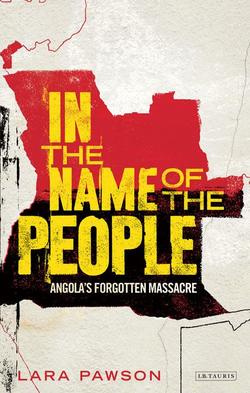
On 27th May 1977, a small demonstration against the MPLA, the ruling party of Angola – led to the slaughter of thousands, if not tens of thousands, of people. These dreadful reprisals are little talked of in Angola today – and virtually unknown outside the country. In this book, journalist Lara Pawson tracks down the story of what really happened in the aftermath of that fateful day. In a series of vivid encounters, she talks to eyewitnesses, victims and even perpetrators of the violent and confusing events of the 27th May and the following weeks and months. From London to Lisbon to Luanda, she meets those who continue to live in the shadow of the appalling events of 40 years ago and who – in most cases – have been too afraid to speak about them before. As well as shedding light on the events of 1977, this book contributes to a deeper understanding of modern Angola – its people and its politics; past, present and future. Taken from I. B. Tauris
Posted on March 25, 2015 by The Orwell Prize -

Anthony Loyd is a war correspondent who writes regularly for The Times and contributes to other publications. He has written two books about his experiences in war zones in Chechnya, Yugoslavia, Sierra Leone, Afghanistan and Iraq: My War Gone by, I Miss it So and Another Bloody Love Letter.
Articles submitted
- A defenceless city can only weep as barrel bombs rain in (£) – The Times, 17/05/2014
- We’ll stay here and die at home, insist Aleppo’s last Christians (£) – The Times, 20/05/2014
- Abducted, beaten, shot: my ordeal in Syria (£) – The Times Saturday Magazine, 04/10/2014
- Orphaned, rejected and afraid: plight of the ebola children (£) – The Times, 01/11/2014
- Anthony Loyd on the war against ebola (£) – The Times Saturday Magazine, 15/11/2014
- Yazidi girls dragged by their hair into sexual slavery and sold for $25 (£) – The Times, 22/12/2014
Posted on May 21, 2014 by The Orwell Prize -
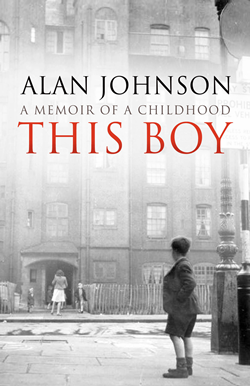
Alan Johnson’s childhood was not so much difficult as unusual, particularly for a man who was destined to become Home Secretary. Not in respect of the poverty, which was shared with many of those living in the slums of post-war Britain, but in its transition from two-parent family to single mother and then to no parents at all…
This is essentially the story of two incredible women: Alan’s mother, Lily, who battled against poor health, poverty, domestic violence and loneliness to try to ensure a better life for her children; and his sister, Linda, who had to assume an enormous amount of responsibility at a very young age and who fought to keep the family together and out of care when she herself was still only a child.
Played out against the background of a vanishing community living in condemned housing, the story moves from post-war austerity in pre-gentrified Notting Hill, through the race riots, school on the Kings Road, Chelsea in the Swinging 60s, to the rock-and-roll years, making a record in Denmark Street and becoming a husband and father whilst still in his teens.
This Boy is one man’s story, but it is also a story of England and the West London slums which are so hard to imagine in the capital today. No matter how harsh the details, Alan Johnson writes with a spirit of generous acceptance, of humour and openness which makes his book anything but a grim catalogue of miseries.
Taken from Penguin.
Posted on April 24, 2014 by The Orwell Prize -

In 1949 Mao Zedong hoisted the red flag over Beijing’s Forbidden City. Instead of liberating the country, the communists destroyed the old order and replaced it with a repressive system that would dominate every aspect of Chinese life. In an epic of revolution and violence which draws on newly opened party archives, interviews and memoirs, Frank Dikötter interweaves the stories of millions of ordinary people with the brutal politics of Mao’s court. A gripping account of how people from all walks of life were caught up in a tragedy that sent at least five million civilians to their deaths. Taken from Bloomsbury
Posted on April 24, 2014 by The Orwell Prize -

Not For Turning is the first volume of Charles Moore’s authorized biography of Margaret Thatcher, the longest serving Prime Minister of the twentieth century and one of the most influential political figures of the postwar era. Charles Moore’s biography of Margaret Thatcher, published after her death on 8 April 2013, immediately supercedes all earlier books written about her. At the moment when she becomes a historical figure, this book also makes her into a three dimensional one for the first time. It gives unparalleled insight into her early life and formation, especially through her extensive correspondence with her sister, which Moore is the first author to draw on. It recreates brilliantly the atmosphere of British politics as she was making her way, and takes her up to what was arguably the zenith of her power, victory in the Falklands. (This volume ends with the Falklands Dinner in Downing Street in November 1982.) Moore is clearly an admirer of his subject, but he does not shy away from criticising her or identifying weaknesses and mistakes where he feels it is justified. Based on unrestricted access to all Lady Thatcher’s papers, unpublished interviews with her and all her major colleagues, this is the indispensable, fully rounded portrait of a towering figure of our times. Taken from Penguin
Posted on April 24, 2014 by The Orwell Prize -
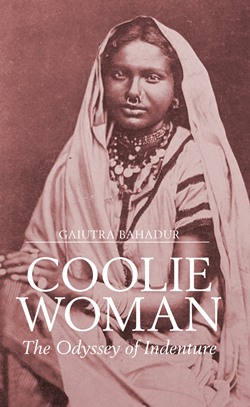
In 1903 a Brahmin woman sailed from India to Guyana as a ‘coolie’, the name the British gave to the million indentured labourers they recruited for sugar plantations worldwide after slavery ended. The woman, who claimed no husband, was pregnant and travelling alone. A century later, her great-granddaughter embarks on a journey into the past, hoping to solve a mystery: what made her leave her country? And had she also left behind a man? Gaiutra Bahadur, an American journalist, pursues traces of her great-grandmother over three continents. She also excavates the repressed history of some quarter of a million female coolies. Disparaged as fallen, many were runaways, widows or outcasts, and many migrated alone. Coolie Woman chronicles their epic passage from Calcutta to the Caribbean, from departures akin either to kidnap or escape, through sea voyages rife with sexploitation, to new worlds where women were in short supply. When they exercised the power this gave them, some fell victim to the machete, in brutal attacks, often fatal, by men whom they spurned. Sex with overseers both empowered and imperiled other women, in equal measure. It also precipitated uprisings, as a struggle between Indian men and their women intersected with one between coolies and their overlords. Taken from Hurst Books
Posted on April 24, 2014 by The Orwell Prize -

Award-winning journalist James Fergusson is among the few to have witnessed at first hand the devastating reality of life in the failed and desperate state of Somalia. This corner of the world has long been seen as the rotting and charred heart of Africa: a melting pot of crime, corruption, poverty, famine and civil war. And in recent years, whilst Somalia’s lucrative piracy industry has grabbed the headlines, a darker, much deeper threat has come of age: the Al Qaida-linked militants Al Shabaab, and the dawn of a new phase in the global war on terror. Yet, paradoxically, Somalia’s star is brightening, as forms of business, law enforcement and local politics begin to establish themselves, and members of the vast Somali diaspora return to their homeland. Fergusson takes us to the heart of the struggle, meeting everyone from politicians, pirates, extremists and mercenaries to aid workers, civilians and refugees. He gives a unique account of a country ravaged by war, considers what the future might hold for a generation who have grown up knowing little else and exposes the reality of life in this hard, often forgotten land. Taken from Random House
Posted on April 24, 2014 by The Orwell Prize -
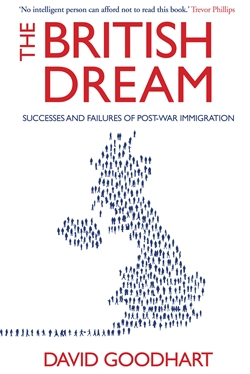
In The British Dream, David Goodhart tells the story of post-war immigration and charts a course for its future. Drawing on hundreds of interviews with people from all over the country and a wealth of statistical evidence, he paints a striking picture of how Britain has been transformed by immigration and examines the progress of its ethnic minorities – projected to be around 25 per cent of the population by the early 2020s. Britain today is a more open society for minorities than ever before, but it is also a more fragmented one. Goodhart argues that an overzealous multiculturalism has exacerbated this problem by reinforcing difference instead of promoting a common life. The multi-ethnic success of Team GB at the 2012 Olympics and a taste for chicken tikka masala are not, he suggests, sufficient to forge common bonds; Britain needs a political culture of integration. Goodhart concludes that if Britain is to avoid a narrowing of the public realm and sharply segregated cities, as in many parts of the US, its politicians and opinion leaders must do two things. Firstly, as advocated by the centre right, they need to bring immigration down to more moderate and sustainable levels. Secondly, as advocated by the centre left, they need to shape a progressive national story about openness and opportunity – one that captures how people of different traditions are coming together to make the British dream. Taken from Atlantic

















